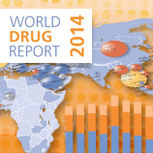World Drug Report 2014:
Control of precursor chemicals is a growing challenge
“Given the growing manufacture of synthetic drugs, the control of chemicals known as precursors, has emerged as a key supply control strategy. This is because the traditional approaches, such as eradication of illicit crops and alternative development, cannot be applied to synthetic drugs”.
The 2014 version of the World Drug Report, published by the United Nations Office on Drugs and Crime (UNODC) pays special attention to the control of precursor chemicals used in the manufacture of illicit drugs. The globalization of the chemical trade has made it easier to divert chemicals from legal to illegal uses. However, the control of precursors, the chemicals needed to manufacture plant-based or synthetic drugs, has tangibly curbed such diversion.
Most drugs, whether plant-based or synthetic, require chemicals to transform them into the final product. While chemicals are only one of the components required for the clandestine manufacture of plant-based drugs (heroin and cocaine), they constitute the essential components of illicitly manufactured synthetic drugs.
New synthetic drugs are an increasing problem in many countries. These drugs are produced quite easily if you have the chemicals components needed, in clandestine factories and even in ordinary kitchens. New substances, often with unknown effects, are produced by minor changes in the molecule structure of the drugs. These drugs often escape national legislation, as national narcotic drug lists do not keep up with the rapid development of new substances.
“Combined with the new opportunities for web-based marketplaces sale via internet, the new so-called legal highs represent a fundamental challenge for national and international drug supply reduction strategies”, comments Dag Endal, FORUT Project Coordinaor on Alcohol, Drugs and Development. “Such strategies can only be successful if they are combined with strong demand reduction efforts. Law enforcement strategies will never solve this new drug problem alone”.
The World Drug Report also addresses another aspect of this challenge, namely the emerging “dark net”: “While the Internet continues to be used as a means of drug trafficking and illicit trade in precursor chemicals, use of the so-called “dark net” has been growing. The “dark net” constitutes a virtual marketplace, which is inaccessible by web search, and where it is difficult for law enforcement authorities to identify website owners and users, as their identities remain hidden by means of sophisticated concealment methods. That makes the “dark net” a safe haven for buyers and sellers of illicit drugs, who trade principally in a digital currency (Bitcoin)”.
The Report and supporting documents can be downloaded at the UNODC web site here.
The World Drug Report notes that some successes have been achieved in precursor control, but they have prompted a range of reactions from the traffickers and manufacturers of illicit drugs, which create new challenges for the international drug control system. "Clandestine operators of illegal laboratories have developed a number of counter-strategies", says the Report. Those strategies include:
- the use of more sophisticated ways to obtain precursor chemicals;
- the use of transit countries with weak control systems;
- the emergence of organized criminal groups specialized in the supply of precursor chemicals;
- the creation of front companies to conceal illegal imports;
- the domestic diversion and subsequent smuggling of precursor chemicals to final destinations in order to bypass the international control system;
- the use of the Internet;
- the misuse of pharmaceutical preparations (notably preparations containing ephedrine or pseudoephedrine) and,
- the emergence of non-scheduled precursor chemicals, including various pre-precursors that can be easily converted into the required precursors.
RELATED ARTICLES
- Children and youth first!
- Amplifying the voice of the silent majority
- Empowerment of children is key in drug prevention
- World Drug Report 2017 is here
- Ten steps for successful national action on drugs
- International protests against drug-related killings in the Philippines
- Report from WHO on effects of nonmedical cannabis use
- UNODC: International Standards on Drug Use Prevention
- A comprehensive menu for reducing drug-related harm
- Prevent drug problems, don't promote them

